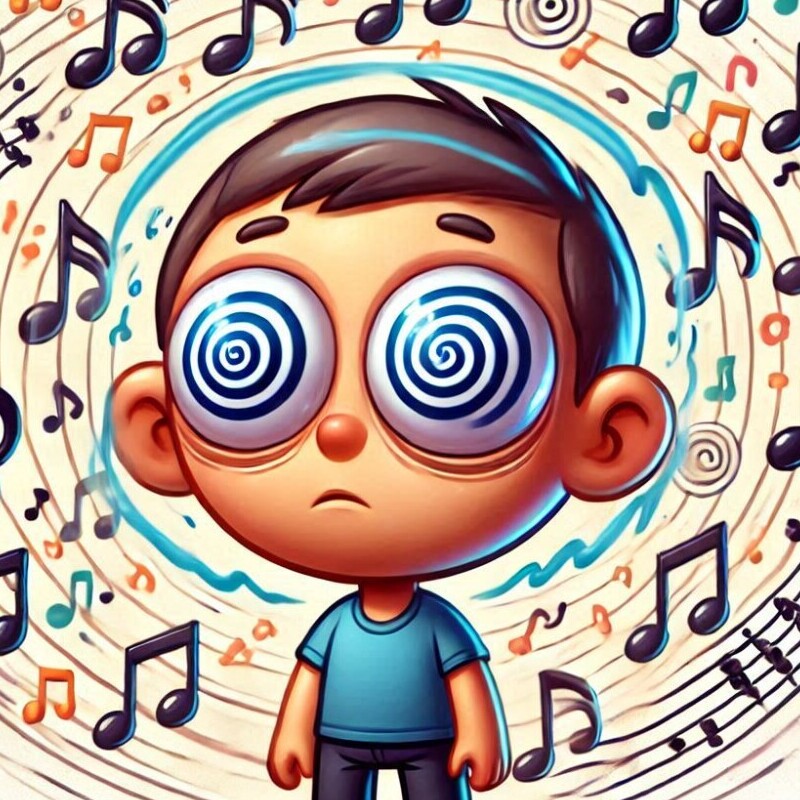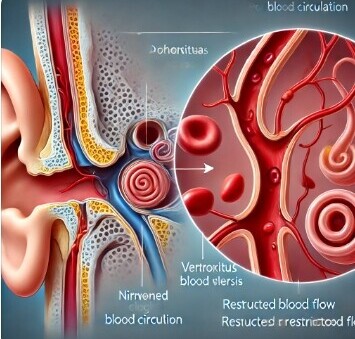Tinnitus is like that uninvited party guest who won’t leave—a persistent noise in your ears that isn’t caused by any external sound.
It’s a condition affecting millions, making daily life a bit awkward. Often described as ringing, buzzing, or hissing, tinnitus comes with its own set of challenges.
Now, imagine adding dizziness to the mix. Feeling off balance or experiencing vertigo can turn life upside down, making simple tasks feel like choreographed stunts. While tinnitus and dizziness can hang out independently, they sometimes team up, causing you to teeter and totter through your day.
This connection between tinnitus and dizziness is more than just a bothersome duo. It can significantly impact quality of life, creating hurdles at work and home.
Yet, understanding this link is the first step in managing these symptoms and reclaiming your peace of mind.
Understanding Tinnitus: More than Just a Ringing in Your Ears
Tinnitus is that sneaky intruder in your auditory world, making you hear sounds that no one else can.
Often, it’s described as a ringing in the ears, but it could also be buzzing, hissing, or even clicking noises.
It affects so many people worldwide, cutting across every age and every walk of life.
Now, tinnitus isn’t monolithic.

There are two main types you might hear about. Subjective tinnitus is the most common, where only you can hear the noise. It’s like having your own soundtrack, one that everyone else is blissfully unaware of.
Then there’s objective tinnitus—rarer and a bit freakier—where a doctor can hear the sound during an examination. This type often links to physical issues like blood vessel problems or muscle contractions.
Tuning into how tinnitus affects individuals daily is part of understanding its broader impact.
Folks often report a noticeable interference with their concentration and sleeping patterns, which can shake up daily routines quite a bit.
Recommended Reading: How Can Tinnitus Cause Sleep Apnea?
Taking a Look At the Connection: Can Tinnitus Cause Dizziness?
Tinnitus and dizziness can sometimes feel like the odd couple in the medical world. On their own, they’re challenging enough, but together, they can complicate life considerably.
Let’s break down how these two might be linked.
Conditions like Meniere’s Disease are big players here. This disorder of the inner ear can throw off your balance big time, not just causing dizziness, but also hearing loss and the infamous tinnitus.
Then there are inner ear infections known as labyrinthitis and vestibular neuritis, which swell up parts of the ear responsible for balance and hearing, causing you to feel dizzy or lightheaded.
Think of it like a bad Wi-Fi connection between your ear and your brain.
Another rare condition is an acoustic neuroma, a non-cancerous tumor. It presses on the nerves of the ear involved in hearing and balance, leading to—you guessed it—tinnitus and dizziness.
So how does all this ear drama mess with your balance?
It turns out the inner ear is a key player in maintaining your equilibrium. When problems arise in this area, it sends mixed signals to the brain, causing you to feel like the ground isn’t quite where you left it.
For some detailed reads, check out studies from medical journals like JAMA Otolaryngology or look into resources from the Hearing Health Foundation. They’ve got the lowdown on how these conditions affect people’s lives day-to-day.
What Makes Tinnitus and Dizziness Co-Occur?
These two troublemakers, tinnitus and dizziness, don’t just wander together by chance—there’s often a trigger lurking beneath the surface.
Inner ear infections or injuries are common culprits.
Whether it’s caused by a pesky virus or a loud concert that was a bit too close for comfort, this type of strain on the ear can mess with your balance and sound processing.
Circulatory issues also play a significant role.
Imagine the inner ear as a device powered by a precise flow of blood. Any disruption in this circuitry can lead to symptoms like dizziness as the ear struggles with its processing tasks.
In some cases, migraines come with their brand of vertigo, where dizziness and tinnitus team up for a one-two punch, thanks to similar pathways being affected.
Hypertension and atherosclerosis can worsen tinnitus and dizziness by reducing blood flow to the inner ear.

Hypertension causes turbulent blood flow, leading to pulsatile tinnitus, while atherosclerosis narrows arteries, restricting circulation and impairing the cochlea (hearing) and vestibular system (balance). Both conditions can damage these delicate structures, triggering symptoms. Managing cardiovascular health through lifestyle changes, regular monitoring, and medical consultation can help alleviate these issues.
Now, how common is it really for people with tinnitus to also experience dizziness?
Studies have shown that a significant number of folks with tinnitus report feeling dizzy at times.
Don’t Ignore the Signs: When Should You Consult a Doctor?
Spotting these symptoms and knowing when to seek help can make all the difference.
Tinnitus and dizziness might just rankle your day-to-day life, but there are times it signal something more serious.
Pay close attention if you experience a sudden loss of hearing.
That’s a red flag that needs immediate attention and isn’t something to brush off as a minor inconvenience. It could be a sign that something’s happening deep in the corridors of your inner ear that demands professional insight.
If vertigo hits you so hard that you can’t go about your usual business, it’s time to ring up a healthcare provider. Regular dizzy spells shouldn’t become a new normal. These can seriously affect your ability to work, socialize, or even relax at home.
Persistent nausea and vomiting also count as signals waving for your attention. If these are cropping up with your dizziness and tinnitus, it’s time to let a doctor in on the situation.
What can you take for the nausea and vomiting?
Usually, I keep over-the-counter medications that contain Cylizine. You can check out Amazon.com, they have Meclizine which you can try out.
If you can get to the doctor, then they may recommend prescription medication containing Betahistine.
They both help to curb vertigo.
Resources like the Mayo Clinic offer a comprehensive guide on when to panic and when to be patient.
The Lancet offers medical article deep-dives if you’re eager to cue into professional perspectives on these symptoms.
No matter your step, acknowledging these signals and acting on them puts you back in the driver’s seat of your health.
Treatment Options: Managing the Double Trouble of Tinnitus and Dizziness
When tinnitus and dizziness tag team against your peace of mind, taking control with the right treatment options can bring relief.
One of the top recommendations is vestibular rehabilitation therapy.
This isn’t your average workout but more like a customized program aimed at improving balance and reducing dizziness. Physical therapists design exercises that challenge your balance while strengthening your muscles to better support you.
Keeping stress under control is another biggie. Stress seems to have a special talent for making tinnitus worse. Armed with techniques like meditation or yoga, you can calm your mind and potentially reduce the severity of those annoying sounds.
For those with Meniere’s Disease, tweaking your diet might help. A low-sodium diet is often suggested to help manage fluid retention in the ear, which can in turn reduce dizziness and ringing noises.
Let’s not overlook over-the-counter (OTC) hearing aids. They can be a game-changer for some people dealing with mild tinnitus.
Not only do they amplify external sounds to help mask internal noise, but their accessibility means you don’t need a prescription to give them a try.
Feel free to check out my reviews on various models, such as the Audien Atom and Jabra Enhance Select 500, providing insights into how these devices work for real users.
Navigating these options with the guidance of your healthcare provider can ensure you’re tackling your symptoms in a way that’s smart and effective, leading you closer to reclaiming your normal routine.
Proactive Steps: Lifestyle Adjustments for Symptom Relief
Keeping tinnitus and dizziness at bay isn’t just about medical treatments. Lifestyle tweaks make a big difference too, helping you regain some control over these challenging symptoms.
Noise is a no-go whenever possible.
Avoid loud environments that can aggravate tinnitus and basically put your ears under attack. Earplugs are your best friends at concerts or in noisy workplaces.
What you eat and drink matters too.
Cutting back on caffeine and alcohol can lead to noticeable improvements, as they’re known to make ringing louder for some. And if you’re struggling with episodes of dizziness, keep an eye on your salt intake much like those with Meniere’s Disease do.
Your mental game is equally important. Practices like mindfulness or yoga can provide stress relief which—bonus!—can alleviate some of that ear ringing and reduce dizziness. It’s all about finding your zen and giving your body a chance to heal.
Gently introducing these changes can lead to more manageable symptoms, so don’t pressure yourself to overhaul everything at once.
These practical adjustments can open the door to a life where tinnitus and dizziness aren’t in the driver’s seat.
Conclusion: How To Survive The Path Between Tinnitus and Dizziness
Tinnitus and dizziness together can create a challenging maze to navigate, but understanding the connection is a powerful first step.
Recognizing the symptoms, seeking appropriate treatments, and making strategic lifestyle changes can open up pathways to relief.
Consulting with healthcare professionals is key. They’re not just there to help diagnose the problem but to offer personalized solutions that fit your unique situation.
Whether through specific therapies, dietary modifications, or even exploring OTC hearing aids, there’s a range of options to explore.
Remember, the goal is to lessen the impact these symptoms have on your life. You’re not alone in this journey.
Many resources and community supports are available to guide you on this path. Every small step you take towards understanding and managing these conditions can make a big difference in improving your overall well-being.
Have you had recent vertigo or dizziness? Did it affect your hearing, or are you suffering from Tinnitus?
What has helped you, or what has made it worse?
Feel free to share your story in the comments section below.
Regards and Take Care
Roopesh
